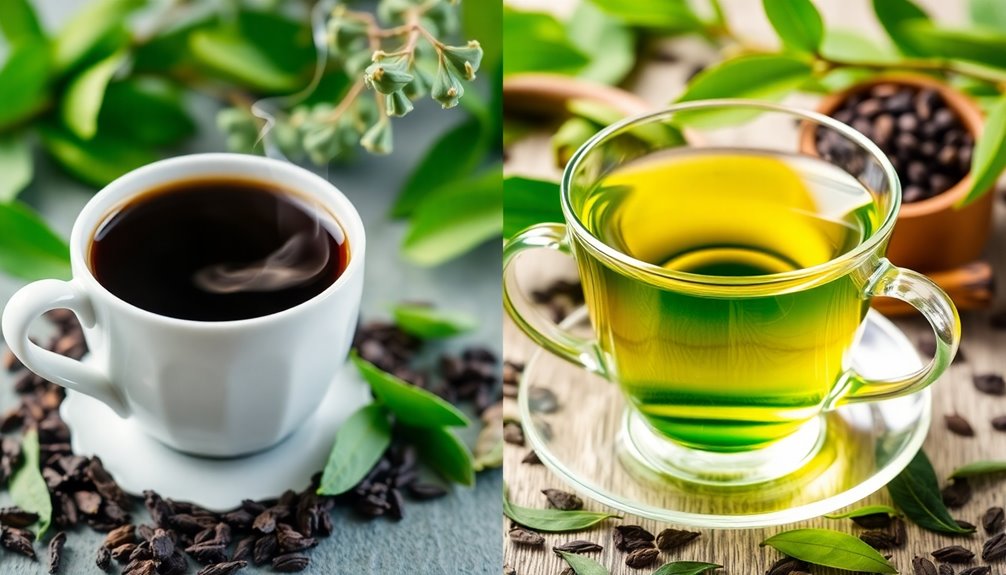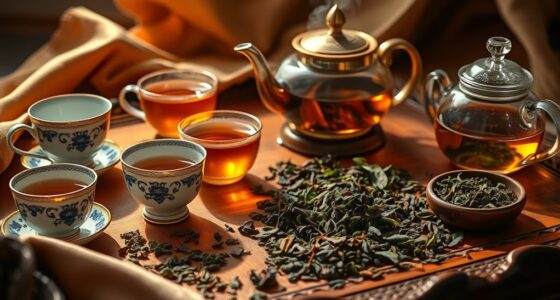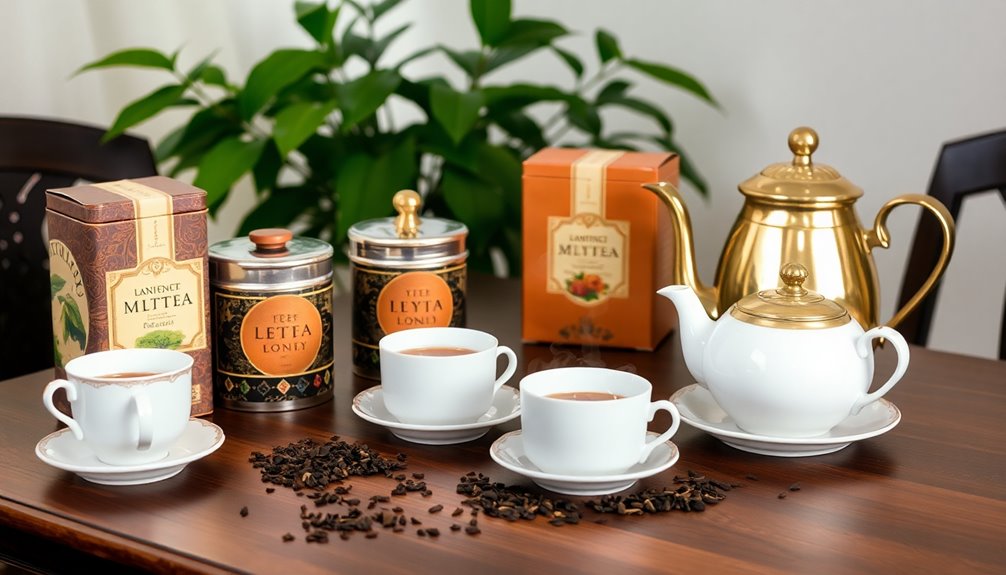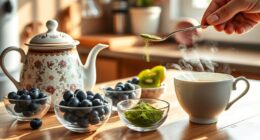Herbal teas are a delightful way to explore nature's flavors while enjoying a range of health benefits. These caffeine-free infusions are made from dried herbs, flowers, fruits, and spices. They can support digestion, promote relaxation, and boost your immune system. Many cultures have embraced herbal teas for centuries, creating unique rituals and traditions. You'll find popular ingredients like chamomile for calming effects and ginger for its anti-inflammatory properties. To get the most out of them, brew with fresh water, steep properly, and experiment with different flavors. Keep going to discover even more about these amazing herbal brews!
Key Takeaways
- Herbal teas, or tisanes, are caffeine-free beverages made from herbs, flowers, fruits, and spices, offering a variety of flavors and health benefits.
- They have historical significance across cultures, used for medicinal purposes and communal rituals, enhancing wellness and connection.
- Rich in antioxidants, herbal teas can help combat oxidative stress, potentially lowering the risk of chronic diseases like heart disease and cancer.
- Popular ingredients include chamomile for relaxation, peppermint for digestion, and hibiscus for its vitamin C content, each with unique health properties.
- Optimal brewing techniques, such as using fresh water and steeping appropriately, enhance flavor and preserve the potency of herbal teas.
Introduction

Herbal teas, or tisanes, offer a unique and flavorful alternative to traditional beverages. Unlike regular teas made from the Camellia sinensis plant, herbal teas come from dried herbs, flowers, fruits, and spices. This means you can enjoy a variety of tastes and aromas that suit your preferences.
Plus, they're naturally caffeine-free teas, making them a great choice if you want to avoid caffeine.
One of the best things about herbal teas is their potential health benefits. They can help with digestion, promote relaxation, and even enhance your overall well-being. Imagine sipping a warm cup of chamomile tea after a long day; it could help you unwind and feel calm. Additionally, many herbal teas, such as flower teas, are rich in antioxidants that support your immune health. Herbal teas, especially those with anti-inflammatory properties, can also be effective in alleviating symptoms of conditions like fibromyalgia.
You can enjoy herbal teas throughout the day, with a recommendation of about 3-4 cups daily, depending on your health needs and taste. With such a wide range of flavors, from minty to fruity, you're sure to find a few favorites.
Herbal Tea's Historical Uses

For centuries, cultures around the world have harnessed the power of herbal teas for their medicinal properties. You might be surprised to learn that the history of herbal teas goes back to ancient civilizations like the Egyptians and Chinese. In fact, it's said that in 2737 BC, Chinese Emperor Shen Nong discovered tea when he boiled water with leaves from a wild tree.
Herbal teas have played a vital role in traditional Ayurvedic medicine, where they help balance the body's doshas and promote overall wellness.
Ancient Greeks and Romans loved herbal teas, too! They often reached for chamomile for digestive issues or peppermint for a calming effect.
Many indigenous cultures worldwide have also relied on herbal teas for both spiritual and physical healing, using local plants with special properties.
So, when you brew a cup of herbal tea, you're not just enjoying a tasty drink; you're sipping a part of history! By understanding these traditional uses, you can appreciate how herbal teas have been an essential part of health practices for generations.
Next time you enjoy a cup, think about the rich history behind it!
Rich in Antioxidants

Discover the incredible benefits of antioxidants found in herbal teas, which help combat oxidative stress and protect your cells from damage caused by free radicals.
When you sip on herbal blends like hibiscus or rooibos, you're not just enjoying a tasty beverage; you're also taking in high levels of antioxidants. These powerful compounds can support your immune function and even reduce inflammation, leading to better health outcomes.
Regularly drinking antioxidant-rich herbal teas may lower your risk of chronic diseases, including heart disease and cancer. It's amazing how something as simple as a cup of tea can play such a significant role in your health.
Different herbal teas contain a variety of antioxidants, such as flavonoids and polyphenols, each offering unique benefits tailored to your needs. Incorporating rooibos tea into your routine can provide added benefits due to its high levels of antioxidants, making it a nutritious choice.
To reap the maximum rewards, try to incorporate a range of herbal teas into your daily routine. Whether you enjoy them hot or iced, these delightful brews can be a refreshing way to boost your health while treating yourself.
Cultural Rituals Surrounding Herbal Tea

Across the globe, countless cultures celebrate the art of herbal tea, each with its own unique rituals and significance. For tea drinkers, these rituals aren't just about sipping a warm beverage; they're about connection and tradition.
In China, herbal infusions are often used for their medicinal properties, showing how tea plays a crucial role in health practices. Additionally, many herbal blends are known for their ability to enhance mood and relaxation, making them a popular choice for wellness. Herbal teas are valued for their antioxidant content, which can contribute to overall health. The use of certain herbs in these teas can also support skin health, highlighting the holistic benefits of herbal infusions. Moreover, some herbal teas, like those containing prebiotic properties, can aid in digestive health.
Meanwhile, in Japan, serving herbal tea as part of a multi-course meal adds depth to dining experiences.
In Morocco, mint tea symbolizes hospitality. It's served in beautiful glasses during gatherings, reinforcing community bonds and cultural identity.
Similarly, in India, the "chai" culture mixes various spices, creating unique blends for different occasions, making gatherings even more special.
In Russia, herbal teas made from local flowers are an essential part of traditional tea ceremonies, emphasizing their importance in Russian hospitality.
Lastly, in Ayurvedic practices, herbal teas help promote wellness and balance, with specific blends crafted for individual needs. Additionally, the use of essential oils for relaxation can complement herbal tea rituals, enhancing the overall experience and promoting calmness.
As you explore these diverse rituals, you'll find that herbal tea is much more than just a drink; it's a bridge connecting cultures, families, and friends around the world.
Health Claims Scrutiny

Herbal teas often come with bold health claims that can be tempting, but it's crucial to approach these assertions with a healthy dose of skepticism.
While many people love to share stories about how a particular herbal tea helped them feel better, these claims often rely on anecdotal evidence rather than scientific research. You might hear that a specific tea can cure headaches or improve sleep, but without strong studies to back these claims, it's wise to be cautious.
Regulatory bodies like the FDA don't require herbal products to prove their effectiveness before hitting the shelves. This means some health claims might be misleading.
As a savvy consumer, it's important to do your homework. Research specific herbal teas to understand their potential benefits and any side effects they might have.
The growing popularity of herbal teas has sparked calls for better testing and clear labeling. These changes could help ensure the health claims you see are trustworthy.
Practical Applications

Incorporating herbal teas into your daily routine can provide a simple yet effective way to enhance your well-being. These soothing beverages can be a delightful alternative to sugary drinks while helping you stay hydrated. Aim for 3-4 cups of herbal tea each day to enjoy the many benefits they offer.
For example, peppermint and ginger lemon tea are fantastic options if you're looking to aid digestion. If relaxation is what you need, chamomile tea can help calm your mind. Hibiscus berry tea not only tastes great but also supports your immune system.
The best part? You can tailor your herbal tea choices to fit your unique taste experience and health needs.
Don't forget to balance your tea intake with plain water to maintain optimal hydration. Experimenting with different herbal tea blends can make every cup an exciting adventure, whether you're unwinding after a long day or looking for a refreshing drink during the afternoon.
Frequently Asked Questions
Who Discovered Herbal Tea?
You might think herbal tea was discovered by a single person, but it actually emerged across various ancient civilizations. Cultures like China, Egypt, and Greece each contributed to its development, using local herbs for wellness.
What Is the Most Healthiest Tea in the World?
When considering the healthiest tea, you might lean toward green tea. Its high antioxidant content, especially catechins, boosts metabolism and lowers chronic disease risk, making it a top choice for health-conscious tea lovers like you.
What Happened to Celestial Seasonings?
Celestial Seasonings faced challenges over the years, including recalls due to contamination issues and quality control problems. However, they've continued to innovate and focus on sustainable practices while expanding their herbal tea offerings.
What Is the Celestial Seasonings Mission Statement?
Celestial Seasonings' mission statement focuses on crafting high-quality, flavorful herbal teas from natural ingredients. They're committed to promoting health, wellness, and sustainability while inspiring you to enjoy relaxation and mindfulness through their unique blends.
Conclusion
Now that you've explored the unique world of herbal teas, why not try some for yourself? With their rich history and potential health benefits, each sip can be an adventure. Remember to choose blends that suit your taste and needs. Whether you're sipping chamomile to relax or peppermint to energize, herbal teas can add joy to your day. So, grab a cup, get cozy, and enjoy discovering your favorite flavors and benefits!










